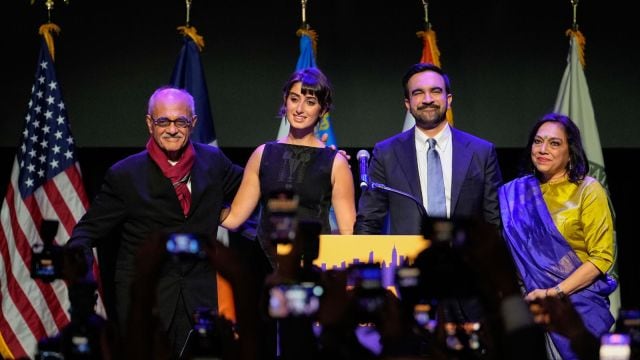
After the President of the United States, the Mayor of New York City is the second most visible job in America. Now, Indian American Zohran Mamdani holds the title. Winning over 50 per cent of the vote in a decisive election powered by South Asians, young people, and fed-up New Yorkers, the 34-year-old Mamdani has helped rekindle faith in American democracy. In the same year that the Trump administration force-fed stories of hate and fear, the Mamdani campaign reminded the city that joy and unity can prevail.
The road ahead for the first Muslim and Indian American mayor of New York City will not be smooth. Even so, many people are buoyed by what is possible, especially in the dark days of a Trump presidency. New Yorkers elected a fighter, one who triumphantly challenged Donald Trump on election night with the words, “Turn the volume up.”
The political establishment will scramble to understand a victory that is being termed improbable and remarkable. What’s clear is this: Zohran Mamdani ran an impeccable campaign, rooted in consistency, creativity and commitment.
His message, “make this city affordable,” resonated with many New Yorkers. Throughout the race, the candidate made affordability the cornerstone of his campaign. In debate answers, off-the-cuff comments, and his acceptance speech on Tuesday night, he defined affordability as a rent freeze, no-cost childcare, and fast, free buses. That consistency mattered not just because it kept his comments clear and understandable, but because it reminded voters that he is steadfast and reliable. As he said in his first speech after the election result: “You showed that when politics speaks to you without condescension, we can usher in a new era of leadership.”
The campaign’s creativity did not suffer as a result of the consistent message. The impressive field operation engaged voters who were going to the polls for the first time as well as those who were undecided. In the last days of his campaign, Mamdani visited senior centres and night clubs, connecting with New Yorkers seemingly everywhere. As he danced salsa and soca and zipped around on a cycle, he showed authenticity and reminded us that we all deserve to be joyous. The campaign’s mood was in stark contrast to that of Andrew Cuomo’s, who stoked fear and appeared defensive.
Alongside consistency and creativity, Zohran Mamdani showed a commitment — to himself and to us. In his tireless campaigning — from visits to churches and gurdwaras and to the streets of New York — he demonstrated his values by working hard for our support. Despite being the target of Islamophobic attacks, the Mayor-elect doubled down on his commitment to his faith and being who he is. In his acceptance speech, he reinforced this message, saying that “New York will remain a city of immigrants” and be “led by an immigrant”.
In City Hall, Zohran Mamdani will continue to navigate minor but meaningful irritations like the mispronunciation of his name and challenges to his citizenship. Instead of making him exceptional, these behaviours remind many Americans that he is like us. Especially now, with the Trump administration waging war on immigrants, Mamdani’s victory is a message that America belongs to all of us, including those who are Muslim, Indian, foreign-born. On Election night, speaking to an audience of supporters, he declared, “This city is your city, and this democracy is yours too.” That’s the kind of spirit that led South Asian aunties to volunteer on his campaign and sing a loving tribute for him in Urdu-Punjabi.
The New York City Mayor-elect is one of three Muslim Americans who ran mayoral campaigns in major US cities. Omar Fateh, a Somali American state legislator in Minneapolis, and Mussab Ali, a Pakistani American in Jersey City, ran unsuccessful campaigns. Like Mamdani, Fateh and Ali are under 40 and ran as progressives. These local races have national and global significance, given the intense polarisation within the United States and around the world. What their campaigns illustrate is that candidates’ ethnicity or religion matters less than the kind of campaigns they run.
A mayor’s background can also shape the way they lead. For example, Mayor Abdullah Hammoud, who is a young progressive Muslim American like Mamdani, has led Dearborn since 2022. His voice has been important during the Palestinian genocide, just as Mayor-elect Mamdani’s has been. Prominent Muslim American leaders are essential to counter the effects of rising Islamophobia and motivate their community members to participate in democracy. Twenty-five years after 9/11, that is significant.
Although representation was one of the Mamdani campaign’s many roots, his victory transcends identity. Zohran Mamdani won by being authentic, reaching new voters and offering a vision that spoke to many New Yorkers. Those are the lessons of this campaign. In fact, Mamdani’s election reminds us that identity is no substitute for strategy. He will not be a mayor just for Indian Americans, but a mayor who happens to be Indian American.
The writer is an Indian American who served as New York City’s first Commissioner of Immigrant Affairs. She advises candidates and elected officials on campaigns and governance